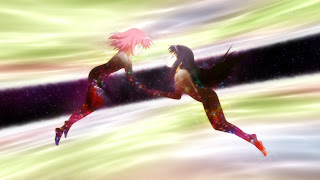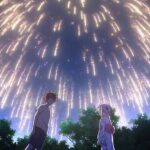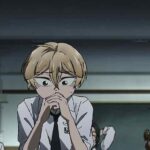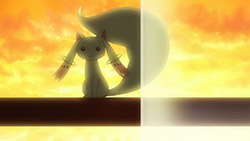 |
| STILL Eeeeevil! |
Whatever else you might care to say about Puella Magi Madoka Magica, it’s one of the most talked-about anime in many a year. Japan or the West, it doesn’t matter – fans everywhere were literally and figuratively atwitter over this remarkably original spin on the Mahou Shoujo genre. In part, quite simply because they liked it – it was an exceptionally interesting series to watch. But also because there was something to argue about after each and every episode. Gen Urobuchi proved himself a writer of dexterity and brilliance, keeping the audience guessing throughout and keeping them interested too. It’s not very often – maybe never – when a Shinbo-directed series isn’t really more about Shinbo than anything else. In this instance, though he certainly created a distinctive visual style this was very much Gen Urobuchi’s series. It’s possible to imagine PMMM with another director – it’s impossible (for me, anyway) to imagine it with another writer.
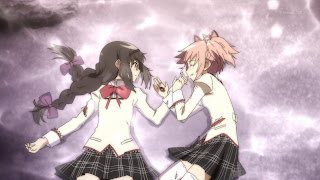
It was clear from the start of the series – really, from the moment Gen’s involvement was announced – that this wasn’t going to be just another magical girl adventure. As the series unfolded, it became clear just how true that was. There were the usual tropes there in the beginning – complete with the cute and cuddly familiar – and though no one could say just what was wrong yet, it was very clear that something didn’t feel right. What followed was a steady progression of boundaries being crossed and expectations being smashed, one by one. Some things were sort of predictable – it was obvious to me from the beginning that Kyuube was evil, for example, though not everyone agreed. It was clear that Homura was going to end up as one of the good guys, if not the main heroine. What wasn’t clear was how that was going to play out, and just how far Gen was willing to go to create an aura of despair and dismay that coated the series like a viscous toxic Beijing fog.
I would argue that, in the end, it was Homura that was the main character of this series whether she had her name in the title or not. It was Homura (and Kyuube) who were always driving the action. Madoka, for all her “everygirl” relateability, was driftwood carried along by larger events – an observer, a commenter, a victim – but not, until the very end, an instigator. It was Homura was was driving everything that was happening on screen. It was Homura who bore the knowledge of an endlessly repeating cycle of ever-increasing despair that she could not share with anyone. And it was Homura (and Kyuube) who was left standing in the end, facing what looked like a post-apocalyptic world where humanity’s darkness had wiped out everyone and everything except the two of them, condemned to their endless battle. Sounds like a main character to me.
 It was certainly a shock when Mami died so early in the series, her head viciously ripped off by a witch – a wake-up call that things could get very dark here. It became somewhat less shocking as the others died off, in turn, especially Sayaka – who might have broken the record for most death flags of any anime character ever. But the manner of their deaths – the sheer despair that went along with them – kept growing. It was as if Gen-san was upping the ante of darkness as each demise occurred until he was all-in – leaving himself seemingly nowhere to go with the ending. I discussed it thoroughly in the last post and it’s being debated endlessly out there in the interwebs, so you can make your own mind up what you think about the direction he chose.
It was certainly a shock when Mami died so early in the series, her head viciously ripped off by a witch – a wake-up call that things could get very dark here. It became somewhat less shocking as the others died off, in turn, especially Sayaka – who might have broken the record for most death flags of any anime character ever. But the manner of their deaths – the sheer despair that went along with them – kept growing. It was as if Gen-san was upping the ante of darkness as each demise occurred until he was all-in – leaving himself seemingly nowhere to go with the ending. I discussed it thoroughly in the last post and it’s being debated endlessly out there in the interwebs, so you can make your own mind up what you think about the direction he chose.
What he was trying to say with all this is hard to judge. Madoka turned herself into something of a Jesus figure in the end, there’s no denying that – the girl who took everyone else’s despair unto herself so that they might be saved. She gave up her own corporeal existence for them, too – choosing to exist as a “concept rather than a person” in Kyuube’s words. Frankly, it doesn’t get much more messianic than that. But what was the larger point Gen was trying to prove here – if indeed, there was a point beyond defying expectations and messing with people’s heads? Without doubt there was a fascinating debate running through the series about Kyuube and its deterministic outlook – its view that the end (saving the universe from heat death, kind of unromantic for the setting if you ask me) justified all its manipulations and lies. Kyuube even – quite rightly, I suppose – brought the subject of livestock into the debate for comparison in the end. While I would never deny humanity’s endless capacity for hypocrisy, my view is that the best analogy for Kyuube is that of a sexual predator. He used his victims to lure other victims into his clutches. Or, if you like, Palpatine from the “Star Wars” mythology – using his victims attachment to the people and things they love to lure them to the dark side.
 There’s a healthy debate on free will going on here, too. Each of these girls – seemingly by rule – must make their wish and decide to become a Puella Magi of her own free will. But really, in any of these circumstances could they have been said to make the choice freely? Is a choice made based on false information a free choice, for starters? And Kyuube was certainly expert at maneuvering them into positions where even if they knew the truth, they felt there was no other way out – Madoka herself being the most recent and glaring example.
There’s a healthy debate on free will going on here, too. Each of these girls – seemingly by rule – must make their wish and decide to become a Puella Magi of her own free will. But really, in any of these circumstances could they have been said to make the choice freely? Is a choice made based on false information a free choice, for starters? And Kyuube was certainly expert at maneuvering them into positions where even if they knew the truth, they felt there was no other way out – Madoka herself being the most recent and glaring example.
In the end, I suppose the show is under no obligation to have one single, overarching point – it’s enough to be interesting. It’s enough to be challenging, and difficult, and ruthless. Madoka Magica has certainly been compared to about as many other stories as any show of late – Faust, The Monkey’s Paw, NGE, Higurashi… The list goes on and, in the end, it had an awful lot of the King James in it as well. It was a fascinating ride – it didn’t grab me emotionally right away, but it always had me hooked from an intellectual standpoint. And now that it’s over, it’s a series I’ll probably be thinking about for a long time, and that says an awful lot about just how good it was. It would be very interesting to see how the ending would have been received had it aired as scheduled, rather than almost six weeks late – but that’s one of those things that will always be left to the realm of conjecture. It is what it is, so let the endless debate continue – that’s as much a part of the Madoka Magica experience as watching the show itself.


